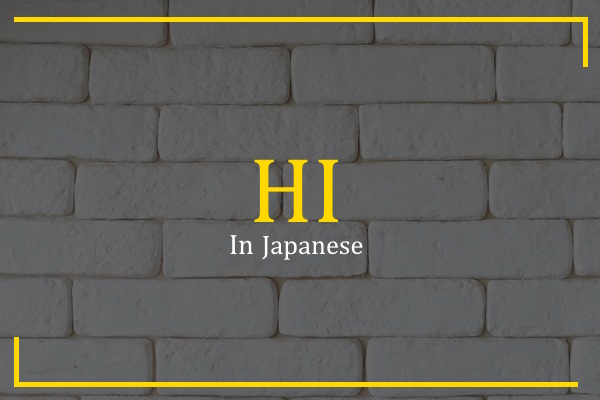Table of Contents
In Japanese “こんにちは” /Kon’nichiwa means “Hi”. If you want to start a conversation in Japanese, you’ll need to know your Japanese greetings! It is easy to learn greetings and you will use them frequently.
Hi in Japanese: こんにちは (Kon’nichiwa)
Some Japanese greetings, like Konnichiwa, may already be familiar to you. However, Konnichiwa normally isn’t used to greeting people, even close ones. How to say hi in Japanese depends on the situation and who you are addressing.
Different Ways to Say Hi in Japanese
These essential Japanese greetings will help you say “hi” in Japanese and more. By knowing different ways to say hi in different languages, it will be easier for you to greet others.
Good Morning
Ohayō gozaimasu おはよう ございます
Here are the Japanese words for a good morning. Most people use this greeting in the morning. Speaking casually with family and friends, you can shorten it to ohay. It sounds like a long ‘oh’.
Hi
Yaa やあ
Using this expression will let you say hello or hey there in a very casual manner! to a close friend. Unless you have a Japanese friend who tells you to use it, I wouldn’t recommend using it.
How have you been?
Ikaga o-sugoshi deshita ka いかがお過ごしでした。
A formal greeting like this is quite appropriate. Whenever you meet someone of higher status than you – perhaps a colleague or professor – you can say this.
How are you?
Genki desu ka 元気ですか
The purpose of this question is to ask how someone is doing more casually. It is common for Japanese people to greet a friend without saying hello with genki desu ka. The honorific prefix ‘o’ makes it more formal: ogenki desu ka? You can just ask Genki for a more casual approach.
How’s it going?
Chōshi wa dou desu ka 調子 はどうですか
Greetings in Japanese mean how are you doing? Have you been doing well lately? It refers to the health of someone.
Good afternoon
Konnichiwaこんにちは
As a way of saying hello in Japanese, most people learn konnichiwa. It’s more like a good afternoon or a good day. During the day, you can use it up until around 5 or 6 pm after 11 am. You used to say ohayō gozaimasu (good morning) instead.
Good evening
Konbanwa こんばんは
In Japanese, konbanwa means good evening. Conversations can be formal or informal.

Arslan Hussain, founder of The Different Languages, is an experienced translator passionate about languages and cultures. Through his website, he shares his knowledge and love for different languages, making learning accessible and enjoyable.

